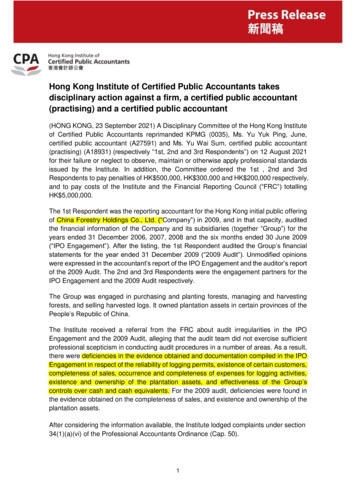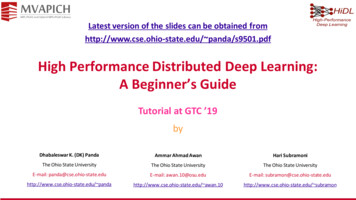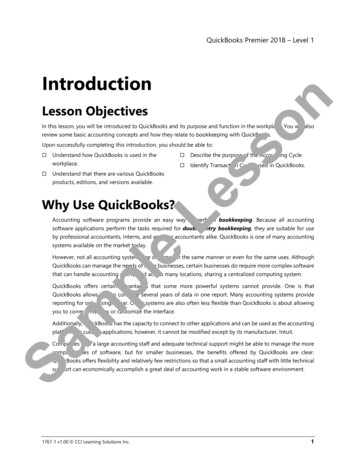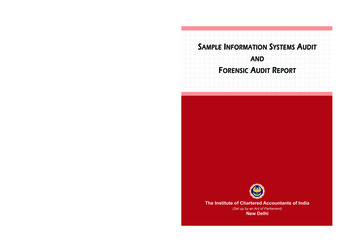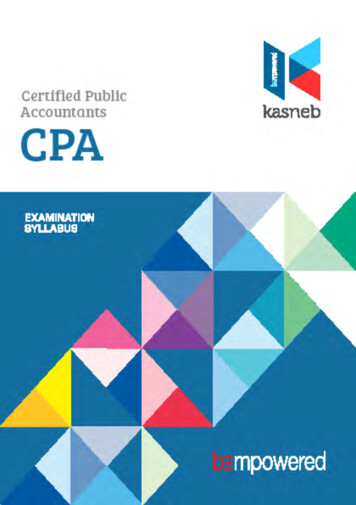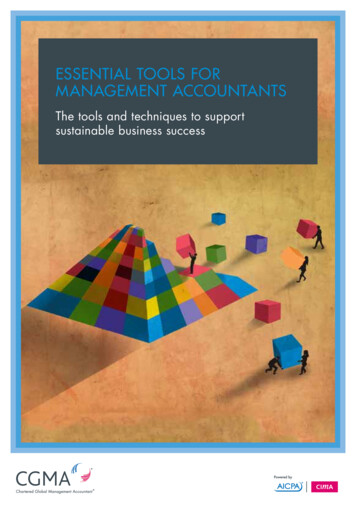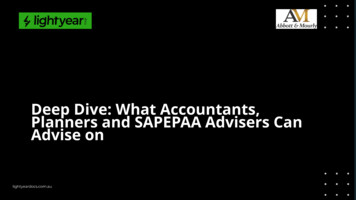
Transcription
Deep Dive: What annersSAPEPAAAdvisersCanAdviseonandSAPEPAAcan Advise onGrant Abbott LightYear Docs
Let’s test your knowledge– right or wrong?1. A client asks their accountant to set up a SMSF. The accountant tells theclient they cannot advise on SMSFs?2. An accountant advises a client to set up a Leading Memberdiscretionary trust to protect family wealth for bloodline. Can anaccountant set up a discretionary trust?3. The sole director of a company established by an accounting firm goesinto liquidation on the death of the director because there is noreplacement director. The Executor takes action against the accountantfor recovery of losses?4. A tax agent advises a client on using a contributions suspense account tomaximise 2022 deductions and not breach the concessional contributions cap.His friend tells him that is illegal.5. An accountant creates an enduring power of attorney based on a datacapture from the client which enables the Attorney to become the Trusteeof a SMSF. His planner colleague said he needs to be licensed.6. A lawyer makes a BDBN for a client that directs death benefitsto the estate without elaborating on the risk of a familyprovisions claims. The Executor sues the lawyer for losses.
We are S A P E P A ASuccession, Asset Protection & Estate Planning Advisers AssociationLeave a Legacy
SINCLAIR v FC of T, Administrative AppealsTribunal of Australia, 16 November 2010SA Forgie (Deputy President)“92. On the basis of the evidence, and particularly that of his solicitors, I find that Mr Sinclair didnot approach them for formal legal advice regarding the taxation consequences of thecontractual arrangements he had made with Towerlake. He did approach Mr Jasper who workedwith him and the solicitors on the arrangements. Mr Jasper said that the three of them, MrSinclair, the solicitor and he himself, worked on the matter. I accept his evidence that they all feltthat an amount paid as pre-paid interest in respect of an activity that produced income wouldbe deductible. As I have found, though, the solicitors did not put that in writing and do notadmit to giving specific legal advice about the particular arrangement entered by Mr Sinclair. MrJasper is a Fellow of the Tax Institute of Australia but he could not give legal advice regarding thetaxation implications of the arrangements.”
Let’s look at taxation - Tax AgentsServices Act 2009
Importantly for Tax AgentsTax Agents Services Act 2009 – Explanatory MemorandumWhere an agent, after consulting the relevant authorities and sources, is stilluncertain of how to apply a taxation law, the agent may choose to seekassistance from another party, such as another agent, a legally qualifiedprofessional, a recognised professional association or recognised BAS agentassociation, a legal professional association, or the ATO
Accountants and Super“The introduction of the Financial Services Reform Act in 2001 heralded a new era of financialadvice reforms that, whether by design or otherwise, included a member’s superannuation interestas a “financial product”. For large superannuation funds that makes sense as a member is turningover their hard earned SGC to a completely independent and faceless super trustee (and behindthe scenes fund manager) to look after their life savings.But what were they thinking with SMSFs? Did they try a one size fits all approach so that a SMSFmember was also caught, although by law they are required to sign off on all investments of thefund. I don’t know but it never really made sense to me. Luckily there was an exemption foraccountants to establish and wind up SMSFs but that “across the board” exemption was replacedwith much fanfare by the limited license for accountants.BUT – did you know there still is a whole raft of exemptions for accountants and tax agents in termsof SMSF advice. Unfortunately, these exemptions are not available for limited license accountantsnor AFSL licensees.”
Keys to SMSF Advice for Accountantsand Tax Agents Know what is a SMSF financial product Know the law Know ASICs guidelines – they are the Regulator!!!! Know how LightYear Docs has been tailored to meet the ASIC guidelines What to do if you are limited license? Where to from here
Know the Corporations Act 2001Section 764A of the CA includes specific investments or products as “financialproducts” for the purposes of CA.From a SMSF perspective, Section 764A(1)(g) provides that a superannuationinterest within the meaning of the Superannuation Industry Supervision Act1993 is a financial product.Turning to Section 10(1) of the SIS Act, the definition of a superannuation interestmeans a beneficial interest in a regulated superannuation fund. As such, any interestin a SMSF is deemed to be a financial product for the purposes of CA.This includes: contributions – lump sums – pensions – rollovers – (BDBN?)
The Tax Agents and LawyersExemption – s 766B of the CA 2001
ASIC Guidance Note INFO 216 Licensed Accountants – Cannot take advantage of the Licensing Exemptions Accountants – Investment strategies are okay as they are not advice to consumers. Setting up SMSF– only if client asks and then must provide an exemption letter Tax Agents – Exempt for any advice is in the “ordinary course of tax agent’s business” and the sameas a lawyers – review of the ASIC guides SMSF Advisers and Administrators – Caught under the current regime and need to limit SMSF advicetouchpoints
ASIC ON SMSF ESTABLISHMENTS FORACCOUNTANTS“You may provide advice on establishing, operating, structuring or valuing an SMSF without an AFS licence: regulation 7.1.29(5) .Where you are relying on this exemption, if your client is a ‘retail’ client (as opposed to a ‘wholesale’ client – see section 761G andrelated regulations for the definition of this term), under regulation 7.1.29(5)(d) you must provide a written statement to your clientthat:1. you are not licensed to provide financial product advice under the Corporations Act2. they should consider taking advice from an AFS licensee before making a decision about a product.The advice you give about establishing, operating, structuring or valuing an SMSF must not amount to an explicit or impliedrecommendation to establish an SMSF, or to acquire or dispose of an interest in an SMSF (or another superannuation product).However, we recognise that advice given to a person about the establishment of an SMSF may also carry an implicitrecommendation that the person acquire an interest in the SMSF. Therefore, you are more likely to be able to rely on the exemptionwhen your client has already made a decision to establish the SMSF before seeking your assistance to take the next steps. Forexample, you may recommend the best structure for an SMSF to suit your client’s situation, after they have made the decision toestablish an SMSF.”
ASIC ON CONTRIBUTIONS FOR TAXAGENTS“Under the exemption, a registered tax agent may provide advice on any tax implications of contributions into an SMSF (or othersuperannuation fund), such as a client’s eligibility to make concessional and non-concessional contributions and the tax treatmentof those contributions. For instance, a tax agent can use a client’s total superannuation balance to advise the client on theireligibility for:1.the unused concessional contributions cap carry-forward2.the non-concessional contributions cap and the two-year or three- year bring-forward period.However, they cannot recommend that a client make a particular level of contributions (although they can advise on themaximum level of contributions a client can make). This is because the decision to make a particular level of contributions involvesconsiderations other than tax.As another example, a tax agent can advise a client that they will be eligible for a tax offset if they make a spousal contribution.The tax agent cannot recommend the amount of the spousal contribution. However, they may provide factual information aboutthe spousal contribution eligibility criteria that is relevant to calculating the amount of the tax offset. This may include, but is notlimited to, the spouse’s income and the amount of the non-concessional contribution to superannuation.”
3. What is giving legal advice?Re Matthews (1938) 79 P 2d 535, (at 108):" the court held that work of the mere clerical kind, such as filling out of skeletal blanks or drawinginstruments of generally recognised and stereotype forms effectuating the conveyance or encumbranceof property, such as a simple deed or mortgage not involving the determination of the legal effect ofspecial facts and conditions, should be generally regarded as the legitimate right of any layman becauseit involves nothing more or less than the clerical operations of the now almost obsoletescrivener. (The scrivener was eliminated in England by the 1804 Act.) The court went on to say thatwhere an instrument is to be shaped from a mass of facts and conditions, the legal effect of which mustbe carefully determined by a mind trained in the existing law in order to ensure a specific result and toguard against others, more than the knowledge of the layman is required and a charge for such servicesbrings it definitely within the term 'practice of the law’.”
3. What is not giving legal advice?LEGAL PRACTICE BOARD -v- COMPUTER ACCOUNTING AND TAX PTY LTD [2007] WASC184In relation to the application of the material part of Legal Practitioners Act, s 77(1), I note the followingfrom Legal Practice Board v Said [2002] WASC 35, at [15] and [17]:"It has been generally accepted in this State that in the particular context of s 77(1) the notion ofdrawing or preparing a document involves 'the use of the intellect to compose the document, the use ofthe brain to select the correct words, to put them in the correct sequence so that the documentexpresses the intention of the parties'; see Green v Hoyle [1976] 1 WLR 575 at 581, per Widgery LCJ and[Palm Management (supra)] per Brinsden J at 109-110. It is on this basis that in this State the mereroutine filling up of a document which is in the form of a precedent has been generally regarded asmerely a 'clerical’ or 'ministerial' function, and that more than this is required to constitute the 'drawing'or 'preparing' of a document for the purposes of s 77(1).
Trust Deeds – automated v worddocumentLegal Practice Board v Computer Accounting and Tax Pty Ltd [2007] WASC 184.Justice Simmonds“It seems to me that on the evidence before me I should find beyond a reasonable doubt that theprovision of the trust deed involved the respondent "directly or indirectly" performing, carrying out orengaging in any work in connection with the practice of law. While true it is that the trust deed wasshown on the website for the respondent as a "Product", it was, like the trust deeds in Marbellup(supra), a "complicated document". It was a document that the respondent required a few days tocomplete in accordance with the instructions of Mr Kingsbury. There is no evidence before me that therespondent had explained it was simply performing a clerical function of completion of a commerciallyavailable document.”
If you need legal help The provision of SMSF advice is ourspecialty – for something moredetailed or complex come to Abbott& Mourly Lawyers Abbott & Mourly can provide sign offon any LightYear documents with alegal letter of advice if you areconcerned Download the Abbott & Mourly appand send your query or document inor you can do inside the documentlightyeardocs.com.au
Where you are relying on this exemption, if your client is a retail client (as opposed to a wholesale client -see section 761G and . the brain to select the correct words, to put them in the correct sequence so that the document expresses the intention of the parties'; see Green v Hoyle [1976] 1 WLR 575 at 581, per Widgery LCJ and .
